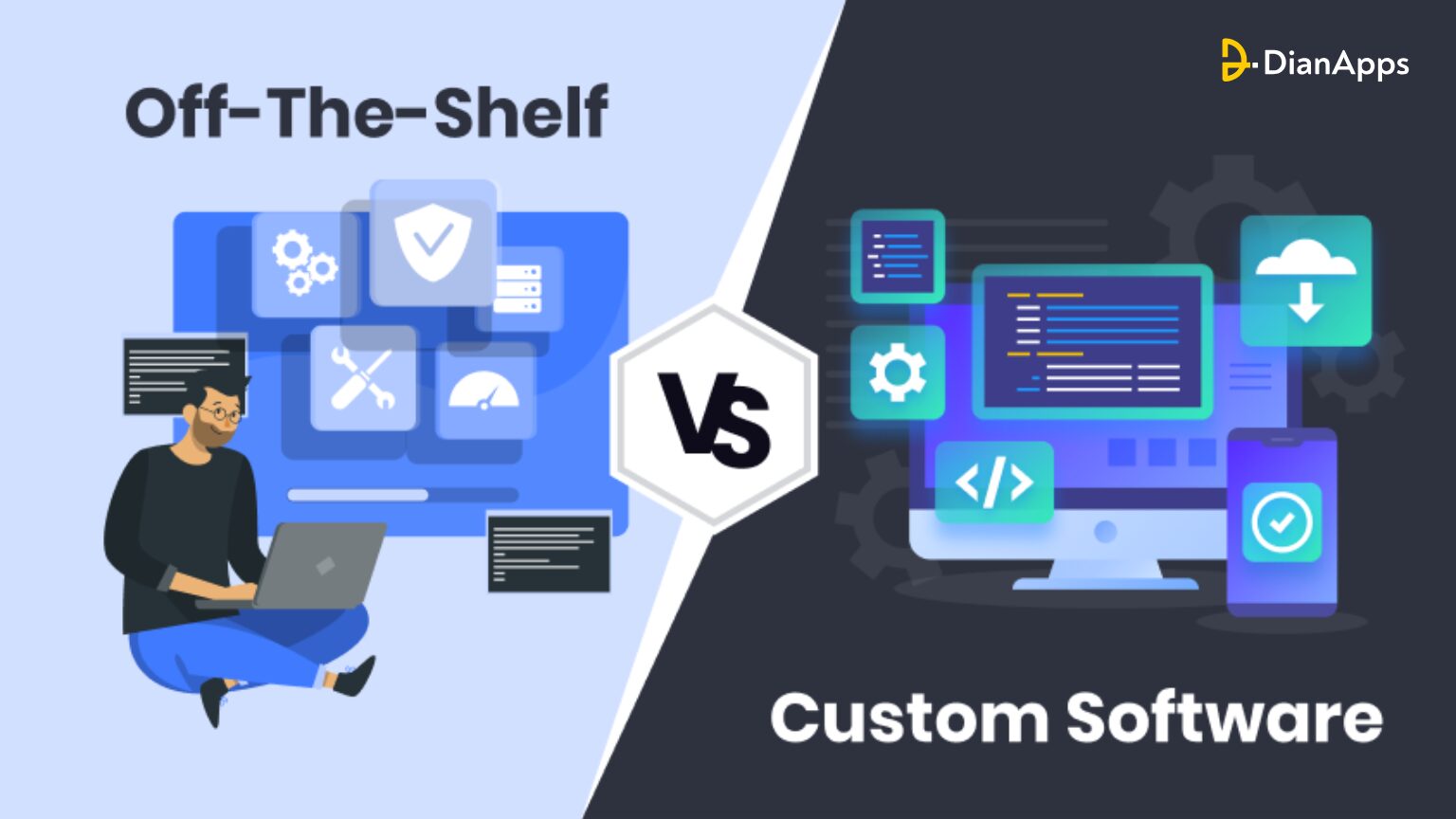These days, software is used by every business in the world. It is an unavoidable fact. Workers engage with data using software that connects to the business’s backend to provide end customers with goods or services, or it can empower businesses by enabling them to connect with various pipelines and delivery networks.
You might have to decide between off-the-shelf software and custom development when selecting software for your company. Each solution offers pros and cons, and your decision will be influenced by a number of variables, including timeliness, money, and company demands.
This blog will describe the benefits, drawbacks, and suitability of bespoke vs off-the-shelf software to assist you in selecting the best choice for your business.
Adoption Trends: Off-the-shelf vs. Custom Software
It may be predicted that there may be a little decrease in the use of off-the-shelf software and an increase in the use of bespoke software when discussing the adoption patterns of the two software categories (for instance, in the ERP category). Let’s take a closer look at the graph below, which was published in ScholarWorks.
Custom software: what is it?
The program is designed to meet the unique requirements of a company or a single user. As the HR director, for example, you wish to implement a payroll system in your company. You are an HR department veteran who is well-versed in the system. You thus made the decision to choose a bespoke solution that would include all the functionality needed for your company’s payroll system.
Benefits of Personalized Software
- It allows you to add only the features that are necessary for your needs and integrate applications in accordance with your business requirements.
- The software development teams provide you with lifelong support.
- You may only pay for what you require and incorporate contemporary features in accordance with demands and new trends.
- As the owner of the product, you have complete control over the additional features and are exempt from paying further licensing fees.
Drawbacks of Personalized Software
- Because it is built just for you, the cost is more than that of off-the-shelf software.
- Depending on the needs, it might take longer to develop, sometimes months.
When Is Custom Software Development the Best Option?
When ready-made software doesn’t completely meet your company objectives or your customers’ expectations, mobile app development services are your best option. In the following common situations, developing bespoke software is unquestionably a superior option:
1. When prioritizing application integration
The capacity of an organization to combine several workflows into one is sometimes restricted by off-the-shelf software. Teams are forced to work with many programs as a result, which ultimately leads to integration and security problems.
Contrarily, custom software allows you to include all of your needs into a single, cohesive solution. It offers a chance to provide data-driven business insights in addition to increasing operational efficiency.
2. When you wish to possess the software and its functionality
Custom software should be your first choice if you are patient and favor long-term solutions over short-term, less expensive ones. Given that you own your software and can customize it to your liking, bespoke software always ends up being more beneficial in the long term.
3. When you wish to guarantee future scalability
Custom software development is your best option if you want to guarantee scalability down the road.
Custom software development enables scalability to be incorporated into the system from the beginning by creating a system that is especially made to satisfy the particular requirements of a company or organization.
This implies that the software may be made to accommodate expansion without requiring significant changes and can readily interface with other systems to boost productivity and support future expansion.
4. When gaining a competitive edge is your top concern
By offering specialized solutions that satisfy your needs, custom software development may provide you with a competitive advantage. You may stand out from the competition and establish a presence in the market with the aid of this distinct edge.
Because custom software is scalable and easily integrated with your current systems, it may improve operations and boost productivity.
Additionally, you have total control over the software’s development and upkeep, guaranteeing that it will always fit your exact specifications.
5. When absolute security is required
Because of the complicated threat environment in cyberspace today, application security is a major problem for contemporary enterprises.
Even while every business takes precautions to protect its software from hacking assaults, the present state of affairs is even worse. Businesses may take extra precautions to shield their data from security dangers and malevolent hacking assaults by utilizing a strong bespoke app solution.
Off-the-shelf software: what is it?
The program in question is pre-made. In contrast to custom software that is created and developed for a specific purpose, you only need to acquire it and it is immediately used. Microsoft Office, for example, is off-the-shelf software.
Benefits of Pre-made Software
- It is prepared for usage. You may evaluate if the product is appropriate for use cases similar to yours by reading other people’s evaluations and learning from their experiences with it.
- When compared to bespoke software, it is reasonably priced.
- Because people are already using it, it has access to pre-existing assistance and solutions to the problems.
- It incorporates features and functionalities from the viewpoint of a larger user base. You might not have such a feature capacity if your work calls for something special.
- You may always test it out before purchasing because it is already developed. A free trial or a freemium edition is also available for the majority of off-the-shelf software.
Drawbacks of Pre-made Software
- Despite being a somewhat less expensive alternative, you can wind up paying more in the long run because of licensing fees, the cost of adding more users, or unstated costs for other features.
- It doesn’t support adaptations to meet your particular company needs.
- Because it is difficult to integrate applications with pre-made software, compatibility problems are likely to continue.
When Is Off-the-Shelf Software the Best Option?
For businesses that need to deploy a solution fast without spending a lot of time and money creating one from scratch, using off-the-shelf software might be a smart choice.
However, there are a few additional reasons to choose off-the-shelf software development than this one:
1. When you wish to significantly reduce expenses
Because the licensing for off-the-shelf software is shared among several purchasers, it is relatively less expensive to develop than bespoke software. A one-time activation cost is all that is required. Using off-the-shelf software is always less expensive since the expense is divided among thousands of customers who purchase the same software license.
2. When utilizing an already-existing user base
Because off-the-shelf software products are often used and well accepted, they already have a user base. By using such software, you may reach a wider audience of potential clients or users and capitalize on this current user base.
3. When installation simplicity is required
Using off-the-shelf software entails obtaining a product that is easily accessible on the market. Since the installation process is typically straightforward, you may purchase the program right away and get it installed on your computer with no difficulty. Custom software, on the other hand, necessitates lengthy cycles of creation, testing, and deployment.
Off-the-Shelf Software vs Custom Software
1. Build Purpose
Custom software is created to address the special difficulties faced by a given company or person. It is made especially for the particular situation and, when constructed properly, offers the ideal answer to your issue.
For instance, you may improve the performance of your software by utilizing serverless technologies. It is designed to support your internal operations. You and your team will find it quite quick and simple to become acquainted with the system’s operation. In the future, it will be easier to adjust the software to ensure that a high performance level is maintained.
Off-the-shelf software has a pre-existing foundation and standard architecture, making it suitable for a broad spectrum of users. There is a possibility that it will not meet your specific needs. You would have to choose one more carefully as a result.
2. Usability: Is off-the-shelf commercial software superior to bespoke software?
Because it is easily accessible, off-the-shelf software has the benefit of being utilized by numerous people. Anyone may purchase it and start using it right away. However, it would need that your operations crew work hard to comprehend the software’s features.
One of our clients worked for a data firm. He approached us with the following issue: “We had a lot of data, but we couldn’t use it effectively. In order to maximize the value of the data, we made the decision to purchase a tool. We purchased a gadget that appeared like the ideal fit for us, but I won’t reveal its identity here. It accomplished what we wanted it to and allowed us to use the data in ways that were previously impossible.
It was laborious from implementation to tool comprehension. There was too much back and forth between us and the software vendor.
3. Cost: Does Custom Software Actually Cost a Lot?
Because the expense of creation is shared by a larger audience, off-the-shelf software has lower upfront costs. Although they are inexpensive to buy at first, they might end up costing you a lot more because of subscription costs, inefficiencies, or continuous upkeep. Using off-the-shelf software also has the unintended consequence of requiring formal training for your operations crew.
Since custom software is created to address particular company objectives, it is initially costly and requires time and commitment. Even if they are pricey, they most likely endure longer and give you a sense of individuality rather than making you feel a little odd here or there.
4. Can commercial off-the-shelf software enable modifications?
Once acquired, off-the-shelf software is hard to change. You have no idea when your company will expand and you’ll need to make changes to the software you’ve already bought.
You must restrict yourself to the features offered by the software you have purchased because you have no influence over the modifications and updates of the aforementioned program. You would have to persuade the software business that your demands are more important than their product plan in order to get the adjustments made to the program.
Conclusion
Every day, the software business is flooded with new software products, whether they are custom-made or off-the-shelf. As was already said in the paragraph above, custom software development services are becoming more and more popular among organizations and people.
A bespoke software solution will meet all of your organization’s demands, therefore, we would suggest it if you’re looking for one that will meet your unique criteria.



